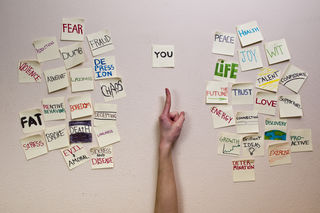Anxiety
What Makes You Anxious?
The four major sources of anxiety.
Posted May 17, 2019 Reviewed by Jessica Schrader

Life is like a poker game. In poker, you're dealt certain cards and then you have a choice: You can hold on to what you've got or trade in your less desirable cards for new ones. Each option has potential risks and rewards. In poker, sometimes you win and sometimes you lose. In life, you’re born with certain genes and raised by a particular family. As you get older, you have choices: you can hold on to the person you are or trade in your less desirable attributes, thoughts, behaviors, and negative behaviors for new ones. You can choose your life experiences. Sometimes you succeed, sometimes you fail. But one thing is true no matter what: anxiety is a fact of life.
You are playing the game of life with four major “cards” in your hand: your genetic makeup, personal development, life experiences, and beliefs and emotions. Each one of the cards enhances or detracts from your ability to win with the hand you’ve got. Together, they determine your overall capacity to manage your anxiety.
Your Genetic Makeup
Your genes give you the raw materials from which your emotional experiences are built. They define how your nervous system operates. They establish your “set point” for anxiety and stress—whether you naturally tend to be highly sensitive and vulnerable or hearty and resilient. Your “gene card” defines your natural tendency for experiencing and managing anxiety in your life. It’s the one card you must keep in your hand!
Your Personal Development
Whatever gene card you are dealt; you inevitably find yourself face-to-face with a family. You are in a relationship with your parents or caregivers, and you may or may not have brothers or sisters. Your extended family may be large or small, functional or dysfunctional or somewhere in between. Whatever your situation, your experiences in early childhood have a profound effect on how you experience anxiety and handle uncertainty and change. Whatever family you were born or raised in, your personal development card is embedded inside you, but you can choose to re-examine and revise it, and maybe even return it to the deck.

Your Life Experiences
Life is an unpredictable journey. You set out on a path, thinking you know where you are going. Along the way, you face obstacles, take detours, and even change direction from time to time. Sometimes you trudge up steep hills or get stopped in your footsteps by something totally unexpected. Sometimes you coast or gain momentum moving forward. One thing is for certain: you never know what is around the next twist in the road. You can find yourself anxious about any aspect of your life at any time. You might be feeling anxious about a relationship with a partner, parent, colleague, or friend. You might get anxious over personal finances, social, or political issues. You might be experiencing anxiety about your performance at work or job security. These are all snapshots in time. Some worries you can control, some you can’t. Some hardships seem impossible to get through. Others are catalysts for growth. They are all part of life’s journey.
Your Beliefs and Emotions
Your deep-seated beliefs and emotions—about yourself and the world around you can become self-fulfilling prophecies. They determine what makes you anxious and affect the amount of anxiety you feel. And they can also influence how you interpret and label your experiences. What you believe and feel can help or hinder you. If they are positive and self-affirming, they can push you to do your best. If they are negative or self-defeating, they can hold you back. Either way, beliefs and emotions can be tough to uncover because they are stored deep within your memory banks in the amygdala, hypothalamus and cortex. Because of this, they will continue to influence your experience of anxiety, for better or for worse. If you want to change them, you will need to devote time, attention, and patience to the task of digging them out and understanding them, but it can be done.
All four of your life’s cards—genetics, development, experiences, and beliefs and emotions—make up the hand you are currently holding. Each one contributes to your experience. Together they point you toward healthy or unhealthy anxiety. Here are some tips to help you live with a healthy amount of anxiety. If you feel like you have an unhealthy amount of anxiety, make sure to discuss it right away with your mental health professional.
Tips for Living With Change, Uncertainty, and a Healthy Amount of Anxiety
- Be fully present in each moment.
- Distinguish between what you can and can’t control.
- Be willing to embrace the unknown.
- Befriend your anxiety.
- Cultivate self-confidence.
- Learn to manage your emotions.
- Focus on your personal goal.
- Keep the bigger picture in mind.
- Practice patience and persistence.
References
Rosen, Robert, Just Enough Anxiety: The Hidden Driver of Business Success. NY: Penguin.
Rosen, Bob & Swann, Emma-Kate (2018). CONSCIOUS: The Power of Awareness in Business and LIfe. Hoboken, NJ: Wiley.


